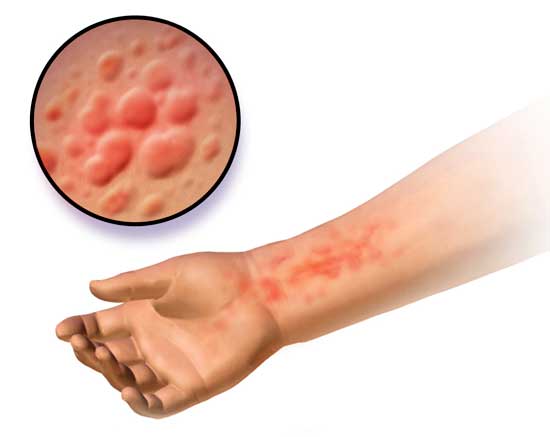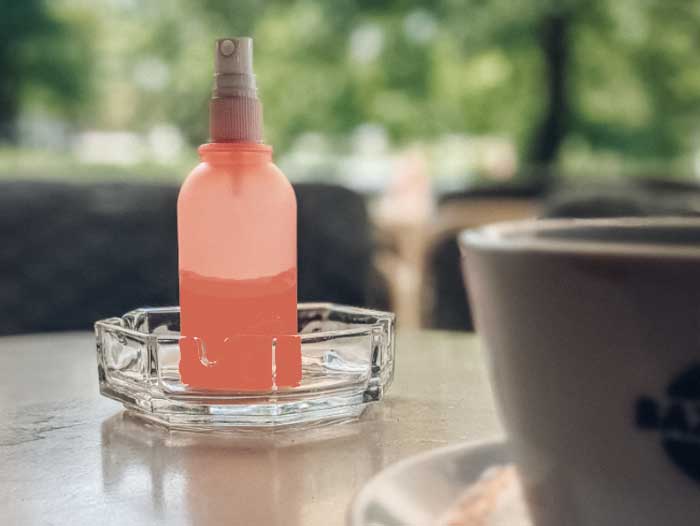Hives and natural remedies
Treating hives with herbs

Hives, officially called urticaria, are closely related to allergies. They are caused by pollen, mites, offending foods, medicines, cleaning products, dust, stress, virus, hormonal changes, and other things we experience in daily life.
Hives usually clear up without treatment, but sometimes people turn to herbal remedies. In persistent cases, an antihistamine can be the best solution.
If your eyes, throat, or tongue, starts to swell, or if you have trouble breathing, seek emergency care as soon as possible.

Herbs can relieve hives.
Stinging nettle tea can help, unless you are not allergic to them. Use the herb in tea and as a wash.
Any herb that fights inflammation can help stop hives. Turmeric is a good one to try, and is available in every grocery store.
Witch Hazel helps relieve some hives. Also try Aloe Vera and diluted apple cider vinegar. You can use these natural remedies as often as needed.
Ayurveda remedies are also useful. Neem, haridra, shirish, vasa, and ashwagandha are a few herbs that can help hives.
Vitamins can help hives.
If you are experiencing hives, try adding vitamin D to your diet or get more early morning sunshine on your back and shoulders. Vitamin B12 is also known to help reduce the reoccurrence of hives, although too much vitamin B12 is known to cause hives in some people.
Stay hydrated!
Anyone that is prone to having hives should pay special attention to their water intake. Drinking plenty of water so that your body stays hydrated is very important.
It may be best to avoid fruit and fruit juice until hives have disappeared. Some people find that avoiding tomatoes can also be beneficial. Of course, there are exceptions to every rule. Some people report that eating fresh pineapple brings relief.
Herbal teas can really help. Try chamomile, valerian, and catnip. These herbs help relax the body and calm anxiety. Teas are especially useful if your hives are brought on by stress.
Burdock and licorice can also help get rid of hives. Use burdock in tea and add three drops of licorice tincture to every cup.

Spray herbal tea on hives.
Other herbs to try include ginger root, basil, peppermint, or green tea leaves. Make a strong tea, cool, strain, and put in a spray bottle. Spray itching hives as often as needed to stop itching.
Cool herbal baths
Oatmeal baths can also help itchy hives. You can also try a cool baking soda bath. Just add a cup of baking soda and soak for fifteen minutes.
Follow up with a light coating of coconut oil. Coconut oil can sometimes help get rid of hives and keep them from returning. Everyone is different, so keep trying until you find something that works for you.
My experience with hives
I get hives in the spring and believe they are caused by grass pollen. They start out slowly, one whelp here and one whelp there. Then more and more appear. They move around, too. The itchy, red areas might be on my shoulders and chest for a couple of hours, then go away to reappear on my hips and thighs.
When hives strike, it is best to wear loose fitting clothing made of cotton or linen. Do not wear wool or polyester, since both of these can make hives worse. Wear a fabric that can breathe!
Heat can also make hives worse. Stay cool if possible and avoid getting overheated. Do not take hot baths or showers, although cool water can help.
Cold compresses and ice packs work to reduce itching and inflammation, unless your hives are caused by cold or temperature extremes.
Trigger foods
Some foods are known to trigger hives. Avoid alcohol, seafood, and fermented foods if you think these things might be the culprit.
Do not use strong soaps, detergents, and perfumes when you are experiencing hives. Stay away from all chemicals including cleansers, chemical sprays, and scented beauty products.
Hives are not contagious, so you don't have to worry about spreading them to your family. Of course, if your hives are caused by a virus, then you will need to protect others from your germs. Do not share eating utensils, linens, or towels.
How long do hives last?
Hives usually disappear within 24 hours. If hives come and go for over six weeks, they are known as chronic hives.
Chronic hives can interfere with daily life and disrupt sleep patterns. This type of hives should be treated by a healthcare professional.
Chronic hives can be an indication of a more serious problem. Sometimes hives are a symptom of thyroid disease, rheumatoid arthritis, diabetes, lupus, liver disease, or another autoimmune condition.
More information from Every Green Herb
Read about herbs for other skin problems like dryness
Read about herbs for eczema
Read about natural treatments for warts, skin tags, and moles
Read about herbs for aging skin and wrinkles
Read about natural remedies to protect against skin cancer
Sources:
https://www.aad.org/public/diseases/a-z/hives-overview
https://www.mayoclinic.org/diseases-conditions/chronic-hives/symptoms-causes/syc-20352719
https://www.emedihealth.com/skin-beauty/more-skin-conditions/manage-hives
Blessings to you and yours!
Thanks so much for reading my blog. Jan.

*Note - the information on this website has not been evaluated by the Food and Drug Administration.
© 2005-2024 website design and content by Janice Boling